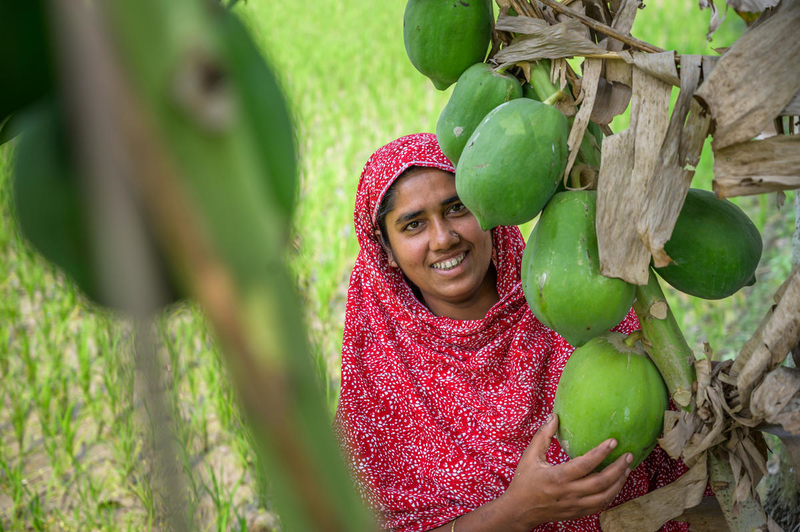Within a month, up to 20 different facilitators, officers, or volunteers might stop by the Rahman’s home and farm in Kusholia village in southwest Bangladesh.
They all work with Nobo Jatra, a five-year food security and development program implemented by World Vision and funded by U.S. foreign assistance. Their main goal: Reduce malnutrition in the region, particularly among women and children.
Foreign assistance helps reduce malnutrition
But there are a lot of factors that can contribute to poor nutrition — and the facilitators each have a field of expertise they use to help families lift themselves out of poverty and ensure their children are thriving.
For example, a nutrition facilitator often stops by to track the growth of Habibur and Fatema Rahman’s new baby, Habiba.

“Before, I had no knowledge about taking care of myself during pregnancy,” says Fatema, the 32-year-old mother of the house. “Now I know how to eat during pregnancy. I can take care of myself and my baby.”
While she was pregnant, Fatema was often visited by one of Nobo Jatra’s nutrition facilitators, Rumana, who uses a pink bicycle to ride from house to house, educating pregnant mothers on how to care for themselves and their babies. Once the babies are born, she continues to visit to check on the children and monitor their growth.
“I really love what I am doing,” says Rumana. “I am doing everything from the core of my heart. I want to continue this kind of work. If Nobo Jatra could extend, it would be helpful for us and for other people, too.”
And the nutrition education paid off: Fatema’s newborn Habiba was much healthier at birth than Fatema’s older children, her son Mustakim, 8, and her other daughter, Beauty, 13.
“I ate more nutritious food,” says Fatema. “I know what food will help my daughter be brilliant and intelligent.”

Foreign assistance promotes better sanitation
To help the whole family stay healthy, a water and sanitation facilitator visits the household to check on their new, clean bathroom and train the family on how to take care of it.
“Before, there was open defecation,” says Fatema. “There were lots of mosquitoes and flies everywhere in my household. Now it has decreased sharply. Now I know I have to wash my hands five times a day, and I know how to maintain this new latrine.”
Foreign assistance helps families prepare for disasters
An organizer who specializes in disaster risk reduction (DRR) also comes by to ensure the family is saving money in the event of a cyclone — an unfortunately common disaster in this part of the country.
“When cyclones start to occur, it starts raining, a heavy wind with a gloomy environment,” says Rini Afroj, the DRR organizer who works with the Rahmans. “The river swells. It floods everything.” She says that during the last major cyclone, the water level rose up to 12 feet in some places. For many families, everything was destroyed.
During that cyclone, the Rahmans felt completely unprepared. Water rose around their house and Beauty got sick. They hadn’t saved money and didn’t know where to go or what to do: “We felt so helpless at that time.”
But with help from Nobo Jatra’s disaster risk reduction component, the Rahmans are ready for anything.

“Now I have a small bank where I am saving money for disaster preparedness,” says Fatema. “We are also storing good vegetable seeds in an airtight packet so that after the disaster we can use them. All the necessary papers, including birth certificates, national ID, and land certificate papers are kept in a polybag and to be carried with us to the cyclone center.”
The family has their emergency plan taped to their door, and everyone in the family (even 13-year-old Beauty!) knows their role in the plan.
It’s through these varied interventions around nutrition, agriculture, sanitation, disaster preparedness, and more that Nobo Jatra is helping families lift themselves out of poverty and empower them to help others in their community do the same.
“Nobo Jatra is not just doing a single thing,” says Rini, the DRR organizer. “Nobo Jatra is trying to change whole lives.”
ACT NOW:
Support programs like this that help families lift themselves out of poverty.
Top photo: Fatema smiles next to her papaya trees. (©2019 World Vision/photo by Jon Warren)



One Comment